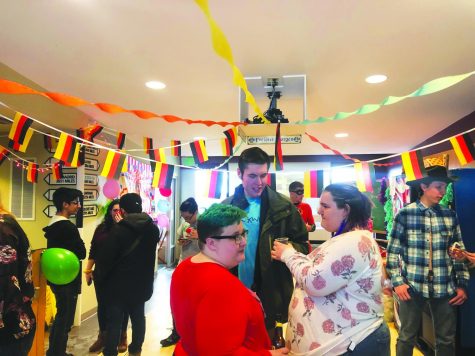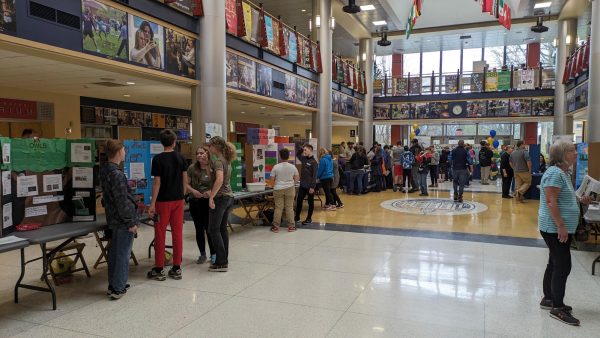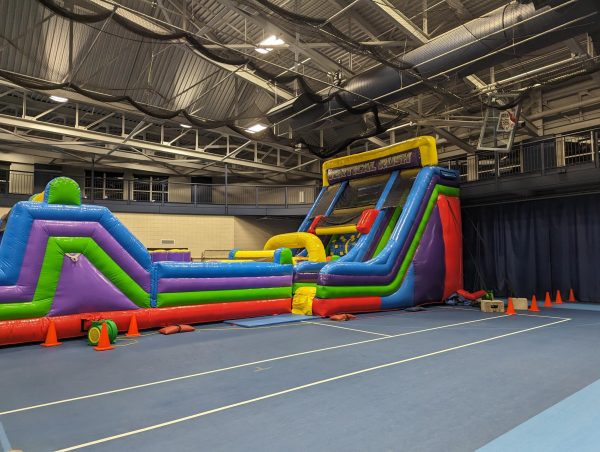Karneval: German House event brings celebration of acceptance, humanity to campus

German students and members of the Allegheny community gather in the lobby area of North Village I to celebrate Karneval.
From 5 to 7 p.m. on Friday, Feb. 28, the lobby of the Max Kade International Wing of North Village I was filled with pretzels, potato salad and Allegheny students in costume. The event was an effort by students in the German house and by German Teaching Assistant Cornelius Stutz to bring Karneval, a lively celebration of spring in the months leading up to the Christian season of Lent and fasting, to the Allegheny community.
“It’s a festival of love, caring for other people, of sharing joy, and accepting everything,” Stutz said.
During the two-hour celebration, students ate recreations of German street food and drank non-alcoholic beer while listening to Karneval music and playing quiz games. Stutz said he hoped the event would be beneficial both for German language students and for all members of the community.
“Language is about more than grammar and vocabulary,” Stutz said. “It’s also about the culture behind it.”
Stutz is one of the five residents of the German house, one language-based special interest ‘house’ — an apartment, technically — available to language students in the Max Kade International Wing. He worked in conjunction with the other four residents, who are Allegheny students, to plan every detail of the event, from what decorations would be put up to what questions would be included in the quiz.
According to Stutz, the celebrations in Germany provided no shortage of inspiration for the event, which lasts for months in his home country until coming to its end on Ash Wednesday, the first day of the Christian season of Lent. He described the opening of the celebration, which takes place at 11:11 a.m. on Nov. 11 every year, as being similar to a New Year’s Eve countdown. A Karneval ‘court,’ made up of a prince, princess and peasant, is chosen to preside over the festivities. According to Assistant Professor of German Julia Ludewig, this is also a popular time to kick off celebrations with a pastry similar to a jelly donut or a fried dumpling.
Such refreshments are just one small part of what Ludewig described as a time when “excess is acceptable,” which she said was just one small part of the appeal of the holiday that also incorporates costumes.
“There’s something to be said about the allure of tradition in general,” Ludewig said. “But I really think there is something to be said about this upheaval, this upturning of social norms that is still very powerful, plus the changing of identities. You have the freedom to be whoever you want during Karneval. Put up a mask and be someone else. That is just a very anthropologically powerful offer.”
These freedoms are expressed not just in costumes, she said, but in other traditions that make up the festivities, like “Weiberfastnacht” or Women’s Night, when women walk the streets with scissors in hand to cut off men’s ties, “literally cutting off their power.”
“It was very much about underlings, or people that didn’t have social power traditionally, taking over,” Ludewig said.
Such social statements are combined with political ones in German Karneval celebrations and particularly in Cologne, which Stutz described as the “Karneval capital” of his country. He said political parody, including critical messages for German and foreign leaders posted to parade floats, is a key part of the modern celebrations of Karneval.
The parade floats are part of “Rosenmontagszug,” or Rose Monday, which the Cologne tourist board calls the “climax of Karneval.”
This and many other celebrations are at their biggest and best in Cologne, according to Stutz and Julia Plechatsch, a German exchange student, who are both from the University of Cologne, which is partnered with Allegheny. Plechatsch fondly recalled the Karnevals she has celebrated there.
“In Cologne, it gets you,” Plechatsch said. “You cannot not celebrate it if you are there because everybody is out there doing something. Everybody is happy. Everybody is totally fine with who you are on that day.”
When Plechatsch says everyone, she is not entirely exaggerating, according to Ludewig.
“Public life really stands still in Cologne during these final days of Karneval,” Ludewig said, adding that streets, offices and the university are all closed while many of the city’s inhabitants take days off work to join the festivities. “You won’t get any answers from the University of Cologne during that week.”
The modern festivities are the inheritance of what Ludewig calls an “ancient tradition” that “in its most important symbolic forms” is a celebration in anticipation of the Christian Lent season of fasting.
“It’s very important to see these events in conjunction with each other, because while fasting of course is a time of restraint and reflection, Karneval is the exact opposite,” Ludewig said. “It’s a time when you feast in anticipation of the fast later on.”
She also emphasized the temporary reversal of social roles in historical celebrations, saying such reversals were even more striking in times of the strict Medieval social hierarchy.
“There was very little social mobility, save for Karneval,” Ludewig said. “That was really a time when all hell literally broke loose.”
This time “like no other in the year,” as Ludewig puts it, has roots in the celebration of spring that stretch back even further than Medieval times to the Roman Empire and beyond. The festivities now known as Karneval largely came to resemble the form we know today in the 18th century, according to Stutz.
While many of the celebrations, like Weiberfastnacht and Rosenmontagszug, stretch back centuries, Stutz also emphasized the festival’s openness to “every person, every gender” and “different cultural and ethnic backgrounds.”
He said his favorite part of his own Karneval memories, the “show of music,” testifies to that openness, with a “melting pot” of languages and cultures represented.
“People come together and just embrace each other and humanity,” Stutz said. “It’s mostly just so impressive to see it, how we sing songs, hug each other and dance together, and it’s just wonderful.”
It was that “joy,” particularly “the fun of being together, of wearing a costume and dressing up,” that Stutz said he wanted to bring to Allegheny’s campus — something larger than pretzels and potato salad.
Olivia Blakeslee is a senior majoring in English with a minor in journalism in the public interest. This is her fourth year on staff, and she is serving...






